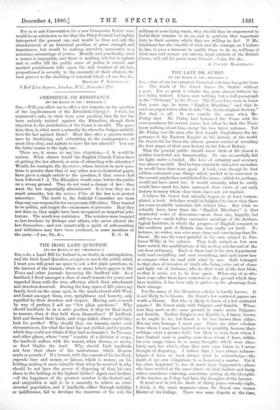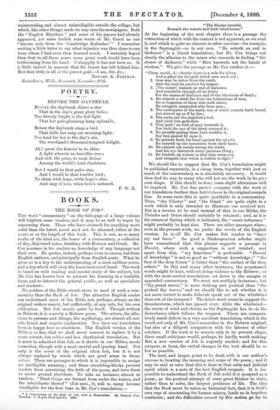THE LATE DR. GUEST.
(To THE EDITOR OF THE "SPECTATOR."]
SIR,—One of our two greatest historical scholars has gone from us. The death of Dr. Guest leaves Dr. Stubbs without a peer. Yet so great a scholar has gone almost without his loss being noticed. I have seen nothing but a dull paragraph in the "Obituary" in the Times. The Times does seem to know that years ago he wrote "English Rhythms," and that he read one paper before what it calls "the Arclarological Society." But that is all. It was exactly the same when Mr. Finlay died. Mr. Finlay had honoured the Times with his correspondence for several years, but, when he died, the Times knew nothing about him, except his two latest volumes. Yet Mr. Finlay was the man who first taught Englishmen the im- portance of the Eastern Empire in the history of the world. Dr. Guest did for them the almost greater service of revealing the first stages of their own history in the Isle of Britain.
That the general public should know little of Dr. Guest is neither wonderful nor blameworthy. No one so carefully hid his light under a bushel. His love of certainty and accuracy was almost morbid. Had he been content to risk a few mistakes, he would have done more good. A book, even though its first edition contained some things which needed to be corrected in the second, might have established his fame,—which he, perhaps, would not have cared for; it would certainly, what he surely would have cared for, have conveyed clear views of our early history to many whom clear views have not yet reached.
I believe Dr. Guest had actually begun, or at least contem- plated, a book. Scholars would be delighted to know that there are some available materials left behind him. But what we actually have, later than the "English Rhythms," is that wonderful series of discourses—more than one, happily, but still too few—made before successive meetings of the Archaeo- logical Institute, in which the progress of English conquest in the southern part of Britain was first really set forth. No lecturer, no writer, was ever more clear and convincing than Dr. Guest. He was the exact parallel in his own subject to Pro- fessor Willis in his subject. They both united, as few men have united, the qualifications of the in-door scholar and of the out-door antiquary. Each of them had in his own department both read everything and seen everything, and each knew how
to compare what he read with what he saw. Both belonged to that class of revealers of truth who bring order out of chaos and light out of darkness, who do their work at the first blow, so that it needs not to be done again. When any of us who have come after them have ventured on the ground which they have trodden, it has been only to gather up the gleanings frpm their vintage.
Yet the name of this illustrious scholar is hardly known. It
is not likely to be known. Dr. Guest's few scattered papers are worth a library. But who is likely to know of a few scattered papers ? Dr. Guest ranks with Palgrave and Kemble. When- ever they meet on the same ground, he ranks above Palgrave and Kemble. Neither Palgrave nor Kemble is, I fancy, known as he ought to be; but Guest is far less known than either. But my own homage I must pay. There are other scholars from whom I may have learned more in quantity, because their writings cover a greater field ; but there is none from whom I have learned more in quality, none from whom I have, within his own range, taken in so many thoughts which were abso- lutely new, but which, when they were once taken in, I never thought of disputing. I believe that I have always acknow- ledged—I have at least always tried to acknowledge—the depth of my own obligations to so honoured a master. Yet it has often happened to me—it must have happened to others who have worked at the same times—to find shallow and hasty critics sometimes admiring, sometimes jeering at, the thoughts of the teacher, as if they had been the thoughts of the learner.
It must now be not far short of thirty years—twenty-eight, I think, is the exact measure—since Dr. Guest was chosen Master of his College. There was some dispute at the time, uninteresting and almost unintelligible outside the college, but which, like other things, made its way into the newspapers. Both the "English Rhythms" and some of his papers had already appeared, yet some foolish man wrote of Mr. Guest as one "known only from the Cambridge Kalendar.' " I remember writing a little letter to say what injustice was thus done to one from whom I had even then learned much. I certainly hoped then that in all those years some great work would have been forthcoming from his hand. Unhappily it has not been so. It is little indeed in amount that Dr. Guest has left behind him. But that little is all of the purest gold.—I am, Sir, &c.,







































 Previous page
Previous page